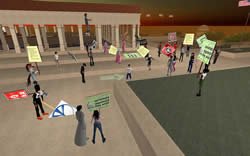 Just when I finally figured out how to get off Orientation Island in Second Life (strictly research purposes only, of course), I've now found out that the virtual world is starting to ever more replicate the real world.
Just when I finally figured out how to get off Orientation Island in Second Life (strictly research purposes only, of course), I've now found out that the virtual world is starting to ever more replicate the real world.
President Bush now has a handful of online avatars that don't like him either. That can't help the approval rating!
On January 29, 2006, it seems that a small cadre of Second Life users "marched" on "Washington", and were successful in crashing a part of Second Life and getting interviewed by BBC News. Oh, and getting blog attention from people like me.
My quandary is this: if my real life is as hectic as it's going to get (something I say every Monday), how in the world am I going to keep up with my avatar's life in a second reality?
Even more important, should I care?
Some real life human beings, like the Wonkette, don't think this is doing more good than harm:
Give it up for liberals: they managed to find the one way left to make traditional protests even more ineffectual and embarrassing. Have 'em on the internet!
Of course, that's what the naysayers always write before the big wave of change comes in to smash them down; however, will a second reality be the next logical step on the Internet? Will PICnet open PICnet Second Life before it opens PICnet Hawaii (I hope not!)?
Technology will always provide new mediums and channels to move messages. Some will be more effective than others, and provide easier access and distribution methods than the ones before them. Some will only be applicable to target niche groups. Only time will tell if Second Life and other virtual reality systems will be a real platform for social change.
For the meantime though, I think extensions of technology that better enable real world experiences will continue to be adopted at a much higher pace than virtual experiences.
People like Katrin Verclas of MobileActive have got it right: facilitate interactions through technology people are already accustomed.